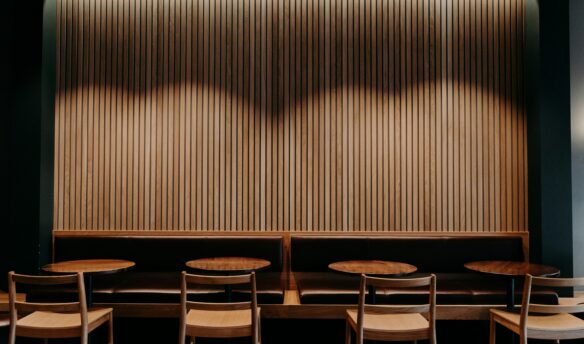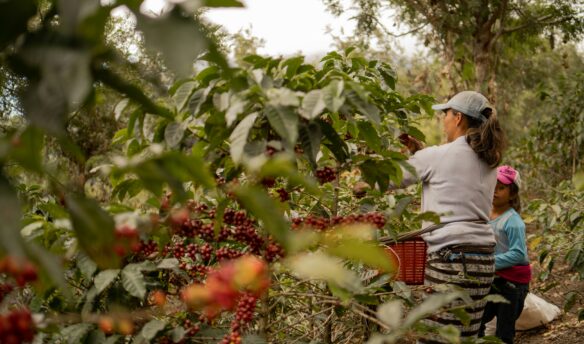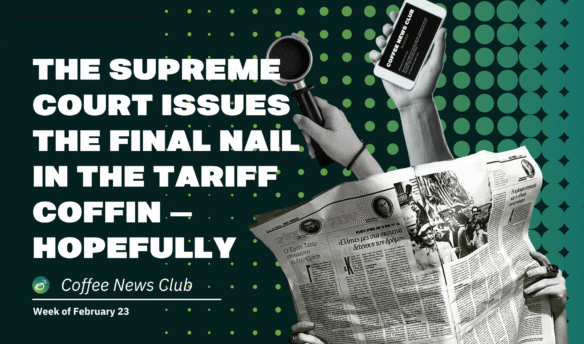Starbucks is closing its flagship store in Seattle. Plus, lawmakers put the European deforestation legislation on hold again, and adding a cup of tea or water in between slamming mugs of coffee could help you live longer.
‘Starbucks To Close Hundreds of Stores, Lay Off 900 Workers as Part of Turnaround Plan’ – via the Associated Press
Last week, Starbucks announced that it would close hundreds of stores across the U.S., Canada, and Europe, and lay off approximately 900 corporate workers.
Starbucks wouldn’t say exactly how many stores would close, Dee-Ann Durbin reports for the AP, just that it would be around one percent. One analyst estimated this would equal about 500 stores in North America.
In a letter to staff, CEO Brian Niccol wrote that the company “identified coffeehouses where we’re unable to create the physical environment our customers and partners expect, or where we don’t see a path to financial performance.” Baristas at impacted stores will be offered transfers to other nearby locations, the letter said.
This is the second time that Starbucks has laid off corporate workers and closed stores this year. The company stated that it would invest approximately $1 billion in restructuring, including severance packages and breaking leases.
Despite the letter being about closing stores, Niccol said Starbucks expects to grow its store count next year. Starbucks also plans to redesign more than 1,000 locations to bring them closer to the “welcoming coffeehouse” he envisaged in his “Back to Starbucks” plan, launched by the CEO to combat years of declining sales.
According to a report by Redd Brown in Bloomberg, investors “largely shrugged at the announcement.” While Starbucks shares fell slightly, Brown reported that “Wall Street might have wanted deeper cuts for a company with 360,000 employees as of last year and 41,000 locations globally.”
Read the full story on Starbucks’ cost-cutting measures here.
‘EU To Delay Anti-Deforestation Law by Another Year’ – via Reuters
The European Union’s divisive Deforestation Regulation (known as the EUDR) was supposed to come into force at the end of 2025. However, Kate Abnett and Makini Brice report for Reuters that legislators are now putting the EUDR on hold for another year until at least December 2026.
Designed to reduce deforestation-related imports, the EUDR was immediately met with controversy. Activists and environmentalists praised the law, with Greenpeace calling it “a major breakthrough for forests and for the people who stood up to protect them.” Industry groups and organizations like Fairtrade International worried about the impact on smallholder farmers who might not be able to comply with the strict reporting requirements.
The original implementation date was the end of 2024. However, lobbying from industry bodies, as well as countries such as Indonesia, Brazil, and Côte d’Ivoire, led the EU to postpone implementation until the end of 2025. Environment Commissioner Jessika Roswall said the latest postponement, which pushes implementation to December 2026, “was necessary to address concerns about the readiness of information-technology systems needed to support the law.”
Under the EUDR, importers seeking to bring certain agricultural products into Europe, including coffee, soy, beef, and palm oil, must demonstrate that the goods are not linked to deforestation. When the legislation was first introduced, coffee industry actors argued that it would be onerous and expensive to comply. In April, the EU relaxed some of these requirements, such as the requirement for companies to provide documentation annually instead of with every shipment.
A World Wildlife Fund report found that EU consumption was responsible for 16% of tropical deforestation in 2021. The EU estimated that a 12-month moratorium risked losing an additional 2,300 square kilometers of forest worldwide.
Environmental organizations criticized the delay, with the WWF calling the latest move “surprising and embarrassing.” The Rainforest Alliance described the postponement as “a blatant violation of all EU commitments to halt global biodiversity loss and climate change.”
Read more on the deforestation delay here.
‘Colombia’s Premium Brand at Risk From Cheaper Brazilian Coffee’ – via Bloomberg
In the wake of Trump’s 50% tariff on imports from Brazil, coffee shipments to the U.S. have fallen by almost half. To compensate for that decline, Brazilian coffee exporters have explored alternative exporting partners.
According to Cecafé, Brazil’s exporters’ association, shipments to Mexico and Colombia increased by 90% and 578%, respectively, in August compared to the same month a year earlier.
Now the head of Colombia’s coffee growers’ federation (known as the FNC) has called for stricter import controls on coffee entering the country from Brazil, according to reporting from Oscar Media and Dayanne Sousa for Bloomberg.
At the beginning of September, NPR reported that U.S. buyers were increasingly looking towards Colombia to replace Brazilian beans in their blends. Colombia’s tariff rate to the U.S. is 10%, significantly lower than Brazil’s, although its coffees generally sell for higher prices.
Germán Bahamón, FNC’s CEO, voiced worries that this might lead “unscrupulous exporters” in Colombia to take advantage of the differential. These exporters might try to repackage or blend the cheaper Brazilian coffee into bags labeled “100% Colombian Coffee” before export, he said.
Bahamón said the government should tighten the rules to “prevent any attempt at coffee triangulation that misrepresents the origin.”
Cecafé pushed back on the idea that its coffee was being blended and then shipped on to the U.S. from Colombia. “Our coffees are being purchased to meet domestic consumption, given the increase in Colombian coffee exports to the US,” Cecafé president Marcio Ferreira said.
Data from the International Coffee Association shows that shipments from Colombia to the U.S. have risen 16% as of July, compared to the same period last year. Analysts theorize that this increase is due to U.S. buyers seeking to diversify their sourcing.
Read more on Colombia’s coffee worries here.
More News
‘Tokyo To Host The 2027 World Barista Championship’ – via Sprudge
‘These Are the Top 100 Coffee Shops in America, According to Yelp’ – via Food & Wine
‘International Coffee Day 2025 Campaign Calls for Urgent Collaboration’ – via Daily Coffee News
‘Coffee Gear Gets A Second Life At Second Shot Market’ – via Sprudge
‘Odeko Buys Speciality Coffee Distributor Six Degrees’ – via Verdict Food Service
‘Nespresso First to Claim Rainforest Alliance Regenerative Certified Coffee’ – via Daily Coffee News
The Week in Coffee Unionizing
Starbucks’ flagship Reserve Roastery in Seattle is one of the locations impacted as part of the company’s recently announced plans to shutter hundreds of stores. The store opened in 2014 as the first of Starbucks’ line of “theatrical, experiential shrines to coffee passion,” as the company described them. Starbucks would go on to open Reserve Roastery locations in cities like Chicago, Milan, New York, Shanghai, and Tokyo.
In its announcement on Thursday, Starbucks stated that the store closures would begin immediately. That same day, the Seattle Times reported that the Reserve Roastery was closed, with boards covering the windows and a sign posted on the door thanking its customers. Starbucks also shuttered a Reserve cafe location inside its Seattle headquarters and removed both locations from its website.
The Reserve Roastery was one of the first Starbucks stores to unionize in April 2022. In a statement to Business Insider, Starbucks Workers United said the union would bargain with the company to ensure impacted workers would be assisted in finding new roles.
“Fixing what’s broken at Starbucks isn’t possible without centering the people who engage with the company’s customers day in and day out,” the union said. “It has never been more clear why baristas at Starbucks need the backing of a union.”
Starbucks said the store’s union status wasn’t a factor in the decision to close the roastery.
Is Coffee Good For You?
The evidence that coffee is good for you continues to grow, although the exact amount to consume for optimal health is still being researched.
While a new study from China can’t say exactly how many cups you should be chugging, it does provide new guidance on how to think about imbibing. As reported by News Medical, the study found that while drinking coffee is beneficial, combining it with tea and water throughout the day is the most effective approach.
The study, published in the British Journal of Nutrition, used data from the U.K. Biobank biomedical database to investigate how substituting coffee, tea, and water for one another affected health, and specifically how they impacted mortality. The researchers collected self-reported dietary data from 182,770 adults and measured mortality outcomes over the next 13 years.
Analysis of the data found that those who consumed a combination of coffee, tea, and water seven to eight times daily had the lowest risk of mortality. In fact, they were 28% less likely to die from all causes compared to those who had the lowest intake of fewer than four drinks per day. Partly, that is due to general hydration, but once someone reached the optimal eight-drink level, the authors found that swapping water for either coffee or tea was linked to reduced mortality.
Notably, as Hugo Francisco de Souza reported for News Medical, the combination of drinks was more important than the total volume. “When total intake was adequate (more than four drinks per day), substituting plain water with either coffee or tea was associated with a further reduction in mortality,” de Souza wrote.
The study authors caution that their findings are observational and rely on self-reported dietary data. Nonetheless, they conclude, “these results highlight the importance of the rational combination of coffee, tea, and plain water, with particular emphasis on ensuring adequate total intake.”
Beyond the Headlines
‘Café Con Reggaetón: Inside the Latin Coffee Shop Day Party Craze’ by Victoria Valenzuela
‘The Hyperreality of Specialty Coffee’ by Fionn Pooler
‘It’s Autumn, but Cold Coffee Is Here To Stay’ by Chloé Skye Weiser







